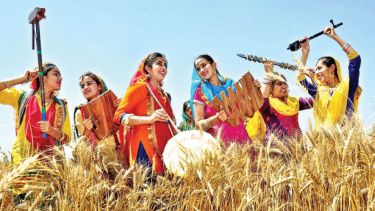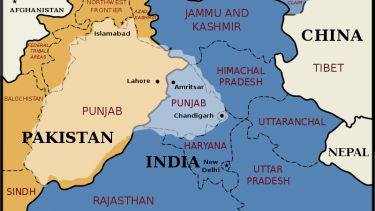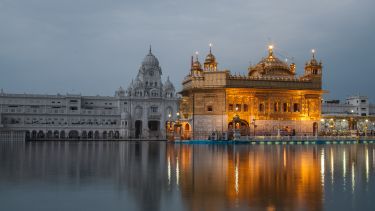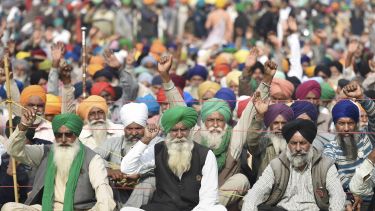Happy Vaisakhi! (Sikh New Year)
Today is New Year, or Vaisakhi, for Sikhs across the globe, so I wanted to take the time to express my felicitations to everyone, everywhere.
Vaisakhi is held on this day, as it has been for centuries, as a celebration of the incoming spring season, but in 1699 the final of the ten human gurus made this an integral part of the Sikh faith movement by forming what is known as the Khalsa – a baptised group of Sikhs that tend to fight for freedom and made this the annual celebration of its anniversary. 322 years later, it is still celebrated widely across the globe.
As a mixed-race person of both White British and Punjabi Sikh ethnicities (the P in my initial stands for Pritam), I have a special place in my heart for Vaisakhi – hence why I am bringing it to your attention today. Last year, I decided to delve deeper into the history of my Sikh side as it was something that I was always curious about. As an adult, and not a child, I could conduct a much more realistic surveying of the history of the Sikhs, and was inspired enough to devote an entire portfolio of poetry to the subject matter for my Poetry 2 module.
Throughout the history of Sikhism, the common goal or belief has been to welcome everyone and treat all as you wish to be treated (a simple doctrine that appears to go wrong in the modern world all too often). The homeland of the Sikh faith originates in the Punjab region and has one of the more confusing territorial borders in the world. Pakistan lays claim to some of the states of the region, whilst India remains steadfast that it is their land. China also attempts to stake claim to the lands whilst the states themselves (Jammu and Kashmir and Ladakh) often state to be of themselves. Historically, with three vast empires on the three sides of the Punjab region, many refugees of persecuted peoples have settled in this area. Whilst many have remained there peacefully, adding to the great cultural diversity there, many have nonetheless been terrorised by governments and religious regimes to convert people to the ‘correct’ religion.
The peoples of Punjab in the modern day are anything from Muslim, Sikh, Hindu, Christian, Parsi, Jain, Buddhist, and various other denominations. The majority of the speakers within this region use the language variety of Punjabi on both sides of the contemptible partition and due to this, people of all faiths in the region are welcomed to join in and often celebrate Vaisakhi regardless. Punjabi itself is in the top twenty most-spoken languages in the world with around 150 million native speakers, but the resources to learn this language are minuscule due to the constant persecution of the Punjabi people by governments in the area.
Whilst this may not be the Happy New Year message of another faith one expects to read, in light of recent movements taking steps towards eliminating discrimination on the basis of a person being a woman, or black, amongst many others, I would like to draw attention to the struggles of the Punjabi people. Currently, India detains people in prison cells for things they did not do just because they are Sikh. News is blocked in certain places to disallow the freedom of the Punjabi people. The government themselves even committed an ethnically-biased attack in 1984 on the Golden Temple (the Sikh holy ground) which gave rise to the assassination of the prime minister and ultimately lead to genocide on the streets where Sikhs were tragically ‘destroyed’. And whilst it is poorly represented on the news – ironic given this country’s colonial past and considering they are also to blame for perpetuating the persecution of the Punjabi peoples, I would encourage you all to look at the Farmer’s Protest.
Unlike most protests that occur in India, it is peaceful. Millions upon millions of farmers came together to stop this continual persecution of good and fine people upon outrage at a government bill backing a great many loss of rights for farmers that would ruin their livelihoods. But it wasn’t on the news. The capital of a superpower in this modern world has been surrounded by a group of farmers who peacefully protest against age-old, systematic racism, and this does not make headlines when this country was involved in the early stages of the 1984 attacks? I encourage you to look it up, as not only is this an amazing feat as fatalities and violence have kept to an impressive minimum given India’s past, but it started in September 2020. That’s right. It lasted almost a year and a half, ending in December 2021 and you likely have not heard a thing. Another thing to add is that several times during this, the unions of India decided to join in the struggle and the majority of the country has been on peaceful strikes a few times. Imagine… 250 million people, several times. The largest recorded protests, and peaceful protests, in history!
This Vaisakhi will be a little different to those in the past, and shall remind the world about the fight for freedom, which is part of the very fundamentals which Sikhism was built upon. I want to wish you all the kindness and opportunity possible. We, as a world, can break through the unimaginably stupid shackling that is discrimination. And we will win. Spare a thought for those less well off than yourself. Spare a moment of your time to think about those who may have suffered more than you on the basis of something uncontrollable such as sexuality, gender, melanin, class, or faith. And mostly, out of all of them, please be kind.
Written by DP, Digital Student Ambassador, on 14 April 2022.




